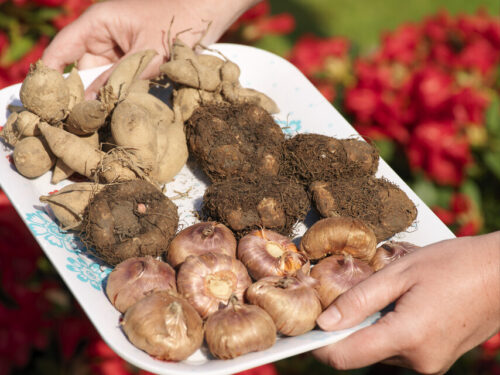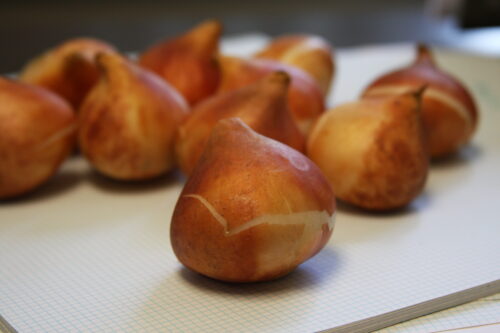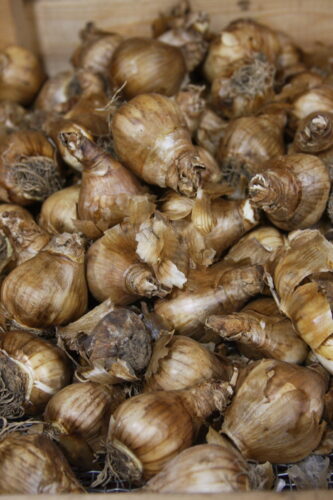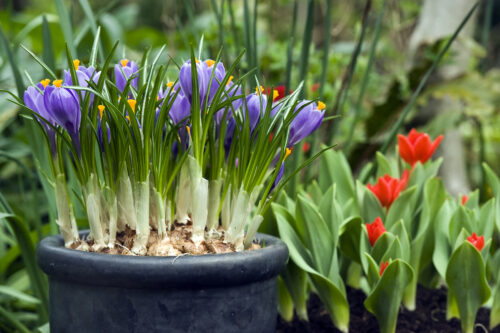Storing bulbs over winter, can it be done? The short answer is yes, you can store bulbs over winter! The long answer is it depends on what kind of bulbs you would like to store over winter and for what reason. We’ll get into additional details on why you would store bulbs over winter. Which bulbs are best to store over winter? The best way to store bulbs over winter. What bulbs should you not plan to store over winter? What happens if you can’t plant all your bulbs in the fall, can you store them?
Storing Summer Bulbs Over Winter
Why Store Summer Flower Bulbs Over Winter
First, let’s address the reasons to store bulbs over winter. The most common reason is the flower bulbs are not winter-hardy in your climate. Therefore, they need to be stored indoors in a protected area where the cold and freezing conditions won’t harm them. The following bulbs are most commonly stored in cold weather climates of hardiness zones 3-7: canna lilies, dahlias, begonias, calla lilies, elephant ears, and gladiolus. Really, any bulbs that were planted in the spring and are not winter-hardy in your area can be stored over winter. Check your hardiness zone here to see what bulbs will survive outdoors in winter.
The Best Way to Store Summer Bulbs for Winter
During the fall and early winter months depending on your region remove the bulbs from the ground before the first hard freeze of the year. Remove the entire plant including the foliage if it is still visible above ground. Shake off any dirt and debris from the bulbs and roots. Find a location for the bulbs and roots to dry a warm and sunny location is best if available. Allow the bulbs to dry for 1-5 days before storing to avoid rot during storage.
When storing bulbs for winter find a location that is above freezing but cooler than 60 degrees. A cool basement, cellar, garage, or outdoor shed are all options depending on your region. Store the bulbs in bags or containers that allow for breathability, yet not too much where the bulbs dry out. Adding wood chips, or vermiculite can help ensure the bulbs don’t dry out or get too moist. For more specific instructions on storing bulbs in winter, read our complete article on How to Store Summer Bulbs in Winter.
Storing Fall Planted Flower Bulbs for Winter
What happens if you run out of time to plant your fall bulbs like tulips and daffodils before the ground freezes can they be stored? This is a frequent question, especially among gardeners new to planting flower bulbs. If time is running out but you can still dig into the ground, you can and absolutely should plant any fall bulbs that remain. Even if they are planted during late fall and the next day a huge cold spell or snowstorm comes they will grow in spring. If possible they should always be planted vs stored.
Let’s say time got away from you and the outdoor landscape is covered in a blanket of snow, or the ground is as hard as concrete. The window of planting time has expired for this fall. That is unfortunate, but don’t lose hope. Yes, you can store the bulbs during the winter months. It is not suggested to store fall-planted bulbs over winter. However, if circumstances don’t allow for planting attempting to store them gives them at least a chance of growing. Keep in mind storing bulbs over winter and planting during spring will void any guarantees on the bulbs. But, throwing them in the garbage also voids the guarantee and gives them zero chance of growing in spring.
How to Store Fall Flower Bulbs for Winter
The ideal way to store fall-planted flower bulbs over winter is in a climate-controlled refrigerated location. Do not place the bulbs in the freezer. They will freeze and then turn to mush when removed from the freezer as they thaw. Fall-planted bulbs that bloom in spring require cold temperatures of at least 12 weeks under 50 degrees to produce a flower bud. That is why storing them in a refrigerator is the ideal location, as they will at least get the cold temperatures needed to bloom.
If refrigerating the bulbs is not an option try to find a cool location to store the bulbs. A location where temperatures are below 50 degrees but above 32 degrees is ideal. If storing in a shed or garage place the bulbs in a secure outer box so that hungry critters won’t feast on them while they are being stored.
Refrigerating Fall Flower Bulbs
Avoid storing the bulbs with fruits that emit ethylene gasses, such as apples, avocados, peaches, pears, and tomatoes. Storing the bulbs with these fruits can cause the bulbs to rot. An ideal refrigeration situation would be one where only beverages are stored such as a garage refrigerator or mini-fridge. Removing the bulbs from their plastic bags is ideal as it will allow the bulbs to breathe while in storage. Store the bulbs in brown paper bags, mesh bags, or cardboard boxes in the refrigerator.
Keep the bulbs in the refrigerator until the ground is workable again in late winter or spring. As soon as the opportunity to plant arises plant the bulbs in the ground. If the temps stay steady and cool this should allow enough time for roots to grow before the top growth and blooms appear. This should allow for blooms in the spring.
If the weather abruptly warms after they are planted, the bulbs will want to grow and bloom. However, without adequate roots, this can lead to stunted blooms. The good news is that these bulbs have a great chance of blooming the following spring since they have been planted. Therefore, if the first spring this scenario doesn’t work, don’t give up there is still a chance for blooms in subsequent years.
Chilling and Forcing Fall Flower Bulbs
Another option for storage in a refrigerator is to plant the bulbs in pots and then store the pots in the refrigerator. This is the process of forcing the bulbs, and after 12 weeks they can be grown indoors or placed outdoors. For more specific information on forcing bulbs check out our Flower Bulb Chilling and Forcing: 101 article.
Save Flower Bulbs for the Future
Storing bulbs is a great way to save money and multiply your collection. It does take a little work and some space to store flower bulbs. However, what you plant in spring can be part of the garden for many seasons to come. If storing them is due to an oopsie situation where time got away from you, there is still a chance for blooms in the future. Flower bulbs are resilient. As long as they are stored in the right setting they have a great chance of growing again in the future.
Check Out Additional Blogs Related to Storing and Saving Flower Bulbs







